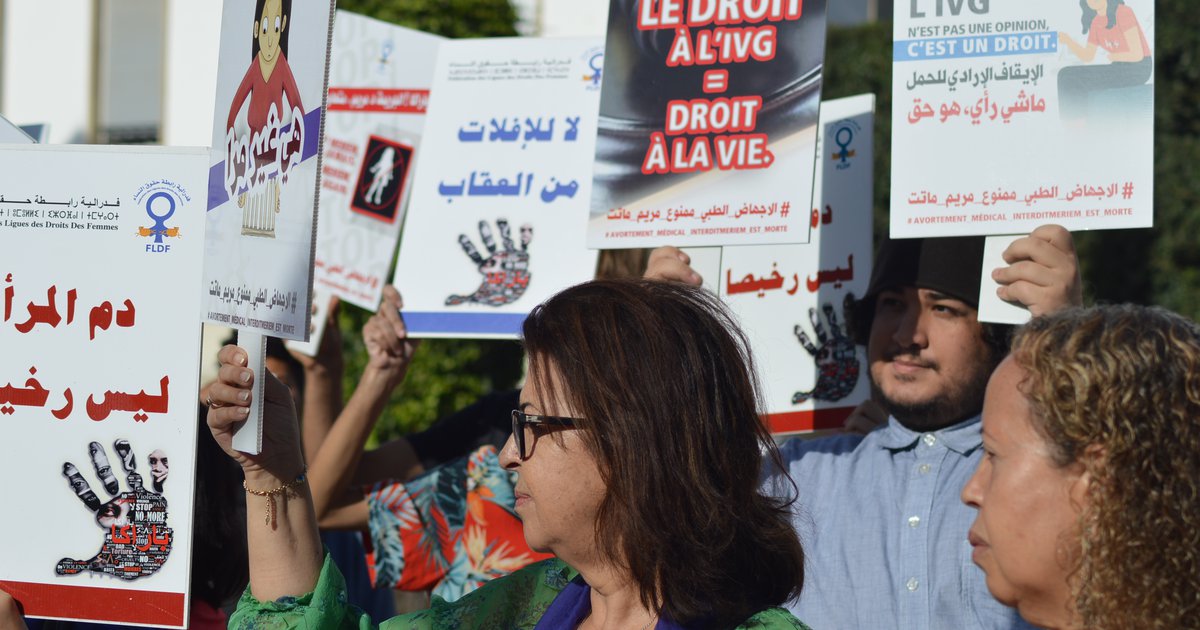On September 6th, 2022, a 14-year-old Moroccan child died from unsafe abortion. Her pregnancy was a result of rape. She died in the home of her abuser. Her name was Meriem and her case is far from being an isolated one. Just one month into 2023, a young woman died following an unsafe abortion. On top of that, four people were arrested for their involvement in the said abortion. The Moroccan Association for the Fight against Clandestine Abortion (AMLAC) estimates that between 600 to 800 clandestine abortions happen in the country every day, sometimes in disastrous conditions.
In Morocco, abortion is only permitted to save a woman’s life. And even in this particular case, the woman needs the husband’s and the doctor’s permission. What is even more appalling is that cases of rape, incest or simply a woman wanting to have control over her own body, are still far from being considered, let alone implemented. This is what extreme patriarchy looks like; it offers absolutely no mercy for victims of sexual abuse. Women’s bodies are being politicized with disastrous consequences, with fallacious religious arguments.
In a country where extra conjugal relationships are still criminalized (Article 490 of the Moroccan Penal Code), authorities are known for being women’s worst enemies. Even when violated, abused and raped, women are too scared to seek help. They will either end up imprisoned for having sex outside of marriage (yes, even if raped sometimes), or will be seen as the ones who brought shame to the family’s honour. In a nutshell, this is victim blaming at its finest.
Another example would be that of a woman who doesn’t have access to abortion and is led to have a child outside of marriage. Then this child won’t be recognized and won’t have any identity. The despair of single mothers in Morocco was Aicha Chenna’s fight and since she recently left us, where does this leave us? Dr Chafik Chraibi, the founder of AMLAC, told the Guardian a few years ago that single women who can’t access abortion, give birth using a false identity and never come back for the birth certificate. Some newborns will be left in trashcans, others will be given to orphanages, and we don’t know what will happen to them.
In 2015, King Mohammed VI called for consultations on legalizing abortion in cases of rape, incest, and severe malformations, emphasizing the urgency to change legislation in the face of the scourge of hundreds of clandestine abortions performed every day. King Mohamed VI commissioned the National Human Rights Council, the minister of justice and freedoms, and the minister of Habous and Islamic affairs to come up with a proposal for a new law.
About seven years later, abortion remains punishable by six months to five years in prison. The Penal Code punishes both the woman who undergoes the abortion (from six months to two years in jail) and the person who performs it (from one to five years in jail). No progress has been made while our women and girls are suffering and dying. Many are forced to bear the child of their rapist, or if not, forced to undergo either pregnancy or unsafe abortion.
As a young Moroccan woman, I am disgusted by the silence of the media, government, political parties, and human rights institutions on this issue. Criminalizing abortions does not stop them. It only makes them unsafe. It is clear that clandestine abortions are still taking place whether it is permissible or not. The ones paying the price are the most vulnerable: children, victims of gender-based violence, women and girls in remote rural areas, and those from lower socio-economic status.
It is time to move forward and legalize abortion in Morocco. We must protect and fulfil the human rights of women and girls. Enough is enough. How many more girls do you want dead in order for you to take concrete action? Society is to be changed as well. Moroccans are more worried about preserving the honour of the family and not doing anything “hchouma”. In that sense, women’s sexual and reproductive rights are last on the list. The simple fact of mentioning SRHR is considered “unethical” and as going against Islamic values and traditions. On the other hand, sex education is key in preventing unplanned pregnancies. The dialogue is rare if not nonexistent. It is not part of school curriculums nor part of family discussions. Most of what young people learn about sex education is through pornography.
I remember when Amina Filali ended her life because she was forced to marry her rapist. Thanks to the mobilization of feminist organizations at the grassroots level, change was enabled. Amina died so that other girls could live without being forced to marry the perpetrators of violence. Article 475 of the Penal Code was revoked. Now it is time to do the same for abortion and change Articles 449, 450 and 453, and 455. In its 2011 Constitution, Morocco guarantees gender equality. Morocco has ratified CEDAW among other international conventions protecting women’s rights. We can’t achieve gender equality if we are still left behind because of sexist, archaic, misogynistic laws and patriarchal structures that perpetuate violence against women and girls.
Time is now for abortion rights in Morocco!
